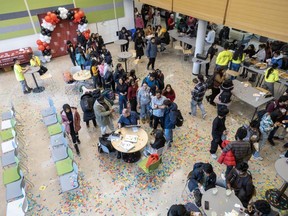A recently announced cap on international student visas already is creating havoc, Ontario’s colleges say, and could have major implications for the province’s ability to fill key jobs.

Two Southwestern Ontario Colleges say a cap on international student visas announced last week could cost them tens of millions of dollars.
Advertisement 2
Article content
Federal Immigration Minister Marc Miller last week announced a 35 per cent reduction in the number of study permits this year, though with the total cap divided between provinces.
Article content
Lambton College in Sarnia estimates the potential loss of income “could be as high as $30 million,” spokesperson Marilyn Mason said.
But because there is so little information, it’s “just a big question mark,” she said.
“It very hard to speculate as far as what that will do in terms of the number of international students,” Mason said.
The college has 1,900 international students, nearly half of the 4,100 students at its campuses.
Lambton College has partnerships with Cestar College and Queen’s College, two private Toronto-area schools, that attract international students, Mason said.
Advertisement 3
Article content
“We’ll be innovative; we’ll respond. It’s just a matter of learning more as we go along,” she said. “But also advocating to ensure international students that are welcome to Canada are provided with the same great opportunities they have in recent history, with post graduation work permits.”
At Windsor-based St. Clair College, Ron Seguin, vice-president of international relations, said although he was surprised by the timing, he “wasn’t surprised by the announcement.”
”Minister Miller had to do something – there are too many parts of international education that are growing out of control – and for the benefit of the system he had to make a call. We respect that,” he said.
About one-third (5,600) of St. Clair’s 16,000 students are international. The college that also has a campus in Chatham is exposed to losing $40 million but not until the 2025-26 fiscal year.
Advertisement 4
Article content
“We have to analyze what that means on the ground level for us in terms of recruitment,” Seguin said. “It will be very detrimental to Latin recruitment because we have many students who bring their families here.”
London’s Fanshawe College says it can’t comment on how the cap in student visas will affect its bottom line. Fanshawe has 4,200 international students at its campuses in London, St. Thomas, Simcoe, Woodstock and Huron-Bruce.
Ontario Colleges say the cap on international student visas announced Jan. 22 is already creating havoc and could have major implications for the province’s ability to fill key jobs.
Colleges have a year-round intake of students and many are well into the application process, ready to start programs in May, the association representing the province’s 24 publicly assisted colleges wrote in a statement Thursday.
Advertisement 5
Article content
“This new and unexpected administrative hurdle has resulted in total chaos for students,” Colleges Ontario wrote.
“The entire system for Ontario is frozen. Students who had already been accepted into programs — and had paid their fees for those programs — are now having their applications for study permits returned to them. This is often without any explanation or way forward. This situation was entirely avoidable and is entirely arbitrary.”
The imposition of an immediate requirement for a letter of attestation from the provincial government is halting all student visa processing right now because Ontario doesn’t currently have such a process, the colleges said. They are calling on the federal government to delay the implementation of that requirement.
Advertisement 6
Article content
Jill Dunlop, Ontario’s minister of colleges and universities, announced more changes Friday. VScolleges and universities will be required to guarantee housing for incoming international students, she said.
The government will also review post-secondary institutions with a “sizable” number of international students and introduce a moratorium on new public college and private institution partnerships, she said.
The temporary two-year cap on visas is intended to slow the rapid increase in temporary residents that has put immense pressure on Canada’s housing system. Miller also said it will give governments time to tackle problems in a system that he says is taking advantage of high international student tuition while providing, in some cases, a poor education.
Advertisement 7
Article content
Ontario will see its allotment of new visas cut in half.
More than 900,000 foreign students had visas to study in Canada last year and more than half of them had newly issued permits. That’s more than three times the number 10 years ago.
College graduates fill key labor market needs, the Ontario colleges said, in areas such as health care, advanced manufacturing, construction and early childhood education.
Recommended from Editorial
In 2022, a report from Ontario’s auditor general said the province’s schools had become increasingly dependent on tuition fees from international students, particularly after the province forced public universities and colleges to cut and then freeze tuition fees for Canadian students in 2019.
Universities have come out against the international student cap as well. The Council of Ontario Universities has said at least 10 Ontario universities already were forecasting a combined operating deficit of $175 million this year, growing to $273 million next year.
The newly announced cap likely would increase these deficits without other measures to compensate for the revenue shortfall, the council said.
Article content

